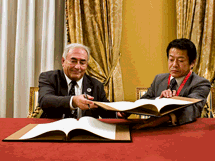
Typical street scene in Santa Ana, El Salvador. (Photo: iStock)
IMF Survey: IMF Gains New Funding, Puts Focus on Bank Clean Up
February 14, 2009
- IMF welcomes Japan loan, seeks to double Fund resources
- Says emerging markets may face big financing problems in 2009
- Clean up of banks critical for recovery from crisis
IMF head Dominique Strauss-Kahn, warning that the global economic crisis was set to bite emerging markets and low-income countries harder this year, said he aimed to double the Fund's lendable resources to $500 billion and thanked Japan for leading the way by contributing $100 billion.

G-7 ministers met to take stock of international measures to tackle the global crisis and limit mounting unemployment (photo: Reuters)
G-7 meeting
Speaking to reporters following a meeting on February 13-14 in Rome of the Group of Seven (G-7) major industrialized countries, Strauss-Kahn said that advanced economies were in a serious recession and the rest of the world was close to one.
Along with implementing planned economic stimulus measures, the next critical step in combating the global financial crisis is to restructure damaged banks and clean up the financial sector, he said.
In a communiqué, G-7 ministers said they were committed to acting jointly to support world growth and employment and strengthen the financial sector, while avoiding protectionism. The ministers met as the U.S. Senate voted in favor of a $787 billion economic stimulus plan—clearing the way for it to be signed into law by President Barack Obama.
Boosting IMF resources
The ministers backed a proposal to increase the resources available to the IMF to help support countries hurt by the crisis. "We agree that a reformed IMF, endowed with additional resources, is crucial to respond effectively and flexibly to the current crisis," their statement said.

Strauss-Kahn (left) exchanges the signed loan agreement with Shoichi Nakagawa, Japan's Minister of Finance, at the Rome ceremony (photo: IMF)
Japan signed an agreement in Rome to lend an extra $100 billion to the IMF and Strauss-Kahn said he aimed to double total IMF lendable resources to $500 billion [see related story on the Japan loan].
"The biggest concrete result of this summit is the loan by the Japanese ... I want to thank the Japanese for having led the way... Now I will continue with the objective of doubling the (IMF) resources," he told reporters. "It is the largest loan ever made in the history of humanity."
Why the IMF needs more money
The IMF has so far committed around $50 billion in lending to a number of economies affected by the crisis, including Belarus, Hungary, Iceland, Latvia, Pakistan, Serbia, and Ukraine. It announced a precautionary loan for El Salvador last month and an IMF team has also been in negotiations with Turkey.
But with the global economy grinding to a virtual halt this year and both trade and capital flows plummeting, Strauss-Kahn foresaw mounting problems for developing countries in the year ahead. "There's going to be a true, massive problem of financing for developing countries in 2009," Strauss-Kahn said.
The IMF needed to be ready because of the fall off in private capital flows, he added. "The balance of payments surpluses emerging markets still had in 2008 will melt like snow in the sun," he warned.
Concessional funds
The IMF Managing Director said low-income countries would face difficulties because of fallout from the global crisis.
"I do not want to talk about financing and forget the poorest countries," he said. "I also want to double concessional resources."
The IMF and the World Bank provide lending to low-income countries at concessional rates to help finance their development.
Cleaning up the banks
Before the meeting Strauss-Kahn welcomed economic stimulus measures announced by several major and emerging market economies and said it was now critical to start applying them.
In Rome, Strauss-Kahn told reporters that the next critical step was to take action to clean up the banking sector. "Today the problem is not really stimulus any more. It's really the problem of the banking sector and the restructuring of the banking sector."
He said that credit markets were still not functioning well, "...so the restructuring of the financial sector is absolutely essential."
"What we must do is to test viability bank by bank. The banks that are viable you must help them with public money. The ones that aren't you must help them to be taken over by another."
Politically difficult
He recognized that spending additional public money was politically difficult when people legitimately felt that the banking sector had created the crisis. But it was important to do so, otherwise the economy would not recover. The IMF had studied 122 banking crises around the world and the lesson was that banks' balance sheets must be cleaned up for real recovery to begin.
"The banking sector can start distributing credit only once it has shrunk and it's been cleaned up," he said.
Comments on this article should be sent to imfsurvey@imf.org







